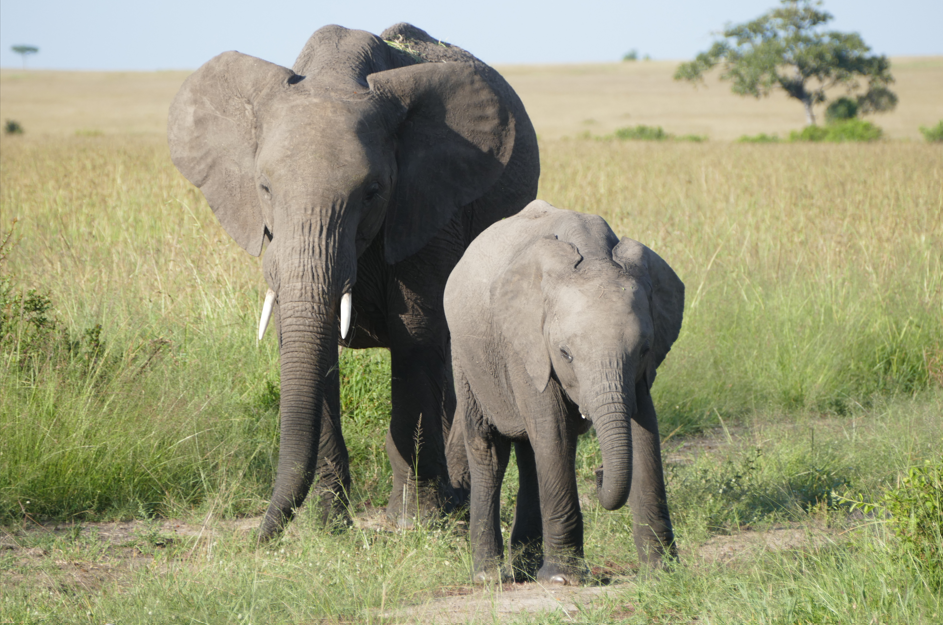Elephants are among the most iconic and revered animals on
Earth, known for their intelligence, social complexity, and size. These
majestic creatures play a vital role in their ecosystems and have fascinated
humans for centuries. In this article, we will explore several aspects of
elephant biology and behavior, including the number of elephant species, their
origin, lifespan, and reproductive patterns.
How Many Species of Elephants Are There on Earth?
There are currently three species of elephants on
Earth: two in Africa and one in Asia. These species are as follows:
- African
Bush Elephant (Loxodonta africana): The largest of all elephant
species, these elephants primarily inhabit savannas, forests, and deserts
across sub-Saharan Africa. African bush elephants are distinguished by
their larger size, larger ears, and more wrinkled skin compared to their
Asian relatives.
- African
Forest Elephant (Loxodonta cyclotis): Smaller and more elusive than
the African bush elephant, forest elephants live in the dense rainforests
of central and West Africa. Their tusks are straighter and smaller, and
their ears are rounder than those of the bush elephant. Forest elephants
were only recognized as a distinct species relatively recently, in the
early 2000s, based on genetic and morphological differences.
- Asian
Elephant (Elephas maximus): Native to the Indian subcontinent and
Southeast Asia, the Asian elephant is smaller than its African
counterparts and has smaller ears. Asian elephants are also domesticated
in some regions, used for work and ceremonial purposes.
Where Do Elephants Come From?
Elephants are believed to have evolved approximately 55
million years ago. The earliest ancestors of modern elephants were small,
pig-like creatures that lived in the forests of Asia. Over time, they evolved
into larger, more specialized animals. The ancestors of modern elephants spread
across various parts of the world, including Africa, Asia, Europe, and North
America.
The ancestors of today's African elephants lived in Africa,
while Asian elephants are thought to have originated in Southeast Asia and
India. The evolution of these giants was driven by changes in climate,
vegetation, and landscape, which influenced their adaptation into the large
herbivores they are today. Fossils of extinct elephant relatives, such as
mammoths and mastodons, provide insights into how these animals once roamed in
ice age environments.
How Many Years Can an Elephant Live?
Elephants are known for their impressive lifespans. On
average, elephants can live 60 to 70 years in the wild. Their lifespan
is influenced by various factors, including their environment, health, and
human interaction. In captivity, elephants can sometimes live longer, but they
often face health challenges and a reduced quality of life due to confinement
and unnatural conditions.
- African
elephants generally live around 60 to 70 years.
- Asian
elephants, though slightly smaller, also have a similar lifespan, but
their longevity is sometimes shorter due to the challenges they face in
the wild, such as poaching and habitat destruction.
How Many Babies Does an Elephant Have in Its Lifetime?
Elephants are known for their slow reproductive rates.
Female elephants typically give birth to one calf at a time, and they
can reproduce once every 3 to 5 years, depending on environmental factors. Over
the course of their lifetimes, female elephants may give birth to between 6
to 8 calves on average, though this number can vary.
The pregnancy of an elephant is particularly long; it lasts
about 22 months, which is the longest gestation period of any land
mammal. Calves are born weighing around 220 to 250 pounds (100-115 kg) and are
able to stand and walk within a few hours of birth. They are nurtured and cared
for by their mothers, with extended family members in the herd often assisting
in raising the young.
Conclusion
Elephants, with their long history, incredible intelligence,
and deep social bonds, are truly remarkable creatures. There are three species
of elephants—two in Africa and one in Asia—with each species playing a unique
role in the ecosystems they inhabit. Elephants can live up to 70 years and have
relatively few offspring in their lifetimes, contributing to the slow pace of
their population growth. Their evolutionary journey and current challenges
underscore the importance of protecting these incredible animals, ensuring they
continue to thrive on Earth for generations to come.
Sources
- "Elephant
Evolution: Where Did Elephants Come From?" National Geographic.
Link.
- "The
Lifespan of Elephants in the Wild and Captivity" ElephantVoices.
Link.
- "Elephant
Species" World Wildlife Fund (WWF). Link.






